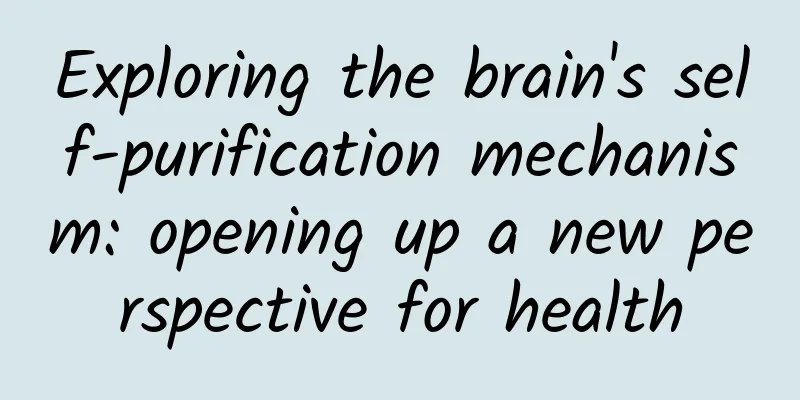Exploring the brain's self-purification mechanism: opening up a new perspective for health

|
The brain is undoubtedly one of the most mysterious and complex organs in the human body. Let us explore the self-purification mechanism of the brain and uncover this important mystery related to our cognition and health. WASHINGTON (AP) — A unique look inside the human brain may explain how it clears out trash, especially the harmful substances that can build up and cause Alzheimer's disease. Brain cells consume a lot of nutrients as they go about their business, which means they produce a lot of waste. Scientists have long believed that the brain has special pipes to flush out this cellular trash, especially during sleep. In mice, scientists can clearly see this process, but there is only indirect evidence for whether a similar system exists in humans. Now, thanks to a special imaging technique, researchers have finally discovered this network of tiny garbage removal channels in the brains of living people. "I was skeptical," said Dr. Juan Piantino of Oregon Health & Science University. "We needed this paper to prove that this phenomenon also occurs in humans." The landmark research results were published in the Proceedings of the National Academy of Sciences. One reason the brain is so active during sleep appears to be that it's deep cleaning itself, a phenomenon that has attracted considerable attention because while insomnia can disrupt our thinking, chronic sleep deprivation has also been linked to a risk factor for dementia. More than a decade ago, scientists at the University of Rochester first reported the discovery of a network they called the "glymphatic system." Cerebrospinal fluid uses channels around blood vessels to penetrate deep into tissues and transport waste until it leaves the brain. When mice were injected with a protein called beta-amyloid, the main cause of Alzheimer's disease, it cleared faster when the animals slept. Exactly how this network works, however, is unclear, although some studies have suggested that the pulsation of blood vessels helps move waste-removing fluid where it needs to go. But finding this system in the human body was not easy. Dr. Piantino noted that regular MRI scans can reveal some of the fluid-filled channels, but they cannot show their function. To address this problem, his team in Oregon injected a tracer into five patients who were undergoing brain surgery and needed more advanced MRIs. The tracer "glowed" under the scans, and sure enough, 24 to 48 hours later, the tracer was not moving randomly around the brain, but moving through those channels, just as it had been found in mice. Dr. Macon Nedergaard of the University of Rochester predicted that this small but potentially important study will greatly increase interest in the relationship between brain waste removal and health. Dr. Jeff Iliff of the University of Washington, who has pioneered waste removal research, said that in order to test whether better sleep or other treatments can actually promote waste removal and improve health, "I have to be able to measure glymphatic function in people." Whether this new study can point the way to that measurement becomes a key question. Sleep isn’t the only factor that influences how the brain cleans itself. Animal studies, for example, suggest that an old blood pressure drug now used to treat PTSD may improve glymphatic function. Dr. Iliff and his colleague, Dr. Elaine Peskind, are about to study the drug in some patients. In the meantime, more large studies in healthy people are needed. Dr. Piantino, whose lab focuses on sleep health, wanted to find a simpler, more noninvasive way to test it. “We can’t study all of these questions by giving people an injection,” he said. The brain's self-cleaning mechanism is essential for our health. Alzheimer's disease, as a serious neurodegenerative disease, brings great pain to patients and their families. Understanding how the brain removes waste, such as beta-amyloid protein, which accumulates and causes Alzheimer's disease, will provide new ideas for preventing and treating the disease. In addition, the important role of sleep in the brain's self-purification also reminds us to attach importance to good sleep habits. Sufficient sleep can not only keep us awake and efficient during the day, but also help the brain to deep clean and maintain its normal function. Long-term lack of sleep may increase the risk of dementia, so we should develop a regular schedule and ensure enough sleep time every day. For scientists who are studying how the brain cleans itself, there is still much work to be done. They need to further explore how the glymphatic system works, find more effective ways to measure it, and develop simpler, noninvasive tests. At the same time, research on drugs and treatments that may improve glymphatic function also needs to be deepened. In this field full of challenges and opportunities, every new discovery may bring great changes to human health. Let us look forward to scientists making more breakthroughs in the study of the brain's self-purification mechanism and opening a new chapter for our health. The author Huang Yanhong is the attending physician of Shimashan Health Center in Lianyuan City, Hunan Province |
<<: The Digestion and Absorption Journey of an Omelette
Recommend
Girls want to urinate when lying down at night
Some girls want to urinate as soon as they lie do...
What should I do if there is an empty gestational sac and embryo arrest?
In fact, an empty gestational sac is also a type ...
What are the dangers of shapewear?
Now many friends are using body shaping underwear...
The woman with spots all over her face does this every day!
In this "face-oriented society", makeup...
Is it easy to gain weight as you age? Is there an "age cutoff" for gaining weight? Learn more in this article →
Obesity has become a global public health problem...
Female mouth feeling nauseous and wanting to vomit
In the early stages of pregnancy, there is indeed...
What fruits can you eat during your period?
Female friends all know that there are many commo...
What are the main symptoms of uterine fibroids?
In life, many female friends are troubled by some...
What to do if you have a fever during menopause
The fever in menopausal women is caused by endocr...
What kind of paper is used for grilling fish? How to make grilled fish with lychee?
Lychee: It is an evergreen tree of the Sapindacea...
What is the situation of lower abdominal pain after sex
I believe that many people have experienced lower...
What medicine can I apply to my rotten nipples?
Breastfeeding mothers all know that they need to ...
What are cashews? What are the benefits of eating cashews?
Cashews are also known as chicken cashews and Jie...
Nine abnormalities in women that must be prevented!
Modern women need to be able to "be both goo...
Can ear creases be used to diagnose myocardial ischemia in coronary heart disease? Rumor: It has little clinical value
I personally rescue hundreds of myocardial infarc...









